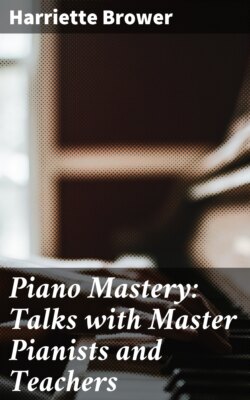Читать книгу Piano Mastery: Talks with Master Pianists and Teachers - Harriette Brower - Страница 25
На сайте Литреса книга снята с продажи.
FILLING IN A PASSAGE
ОглавлениеTable of Contents
"You suggest that a composer may fill in or make up a passage, should he forget a portion of the piece when playing in public. True; but improvising on a well-known work is rather a dangerous thing to do in order to improve a bad case. Apropos of this, I am reminded of an incident which occurred at one of my European recitals. It was a wholly new program which I was to give at Vevay. I had been staying with Paderewski, and went from Morges to Vevay, to give the recital. In my room at the hotel I was mentally reviewing the program, when in a Mendelssohn Fugue, I found I had forgotten a small portion. I could remember what went before and what came after, but this particular passage had seemingly gone. I went down to the little parlor and tried the fugue on the piano, but could not remember the portion in question. I hastened back to my room and constructed a bridge which should connect the two parts. When the time came to play the fugue at the recital, it all went smoothly till I was well over the weak spot, which, it seems, I really played as Mendelssohn wrote it. As I neared the last page, the question suddenly occurred to me, what had I done with that doubtful passage? What had really happened I could not remember; and the effort to recall whether I had played Mendelssohn or Stojowski nearly brought disaster to that last page.
"As soon as my season closes here I shall go to London and bring out my second piano concerto with the London Symphony Orchestra, under Nikisch. I shall also play various recitals."
It was my good fortune to be present at the orchestral concert at Queen's Hall, when Mr. Stojowski was the soloist. It was pleasant to see the enthusiasm aroused by the concerto itself, and the performance of it by the artist.
